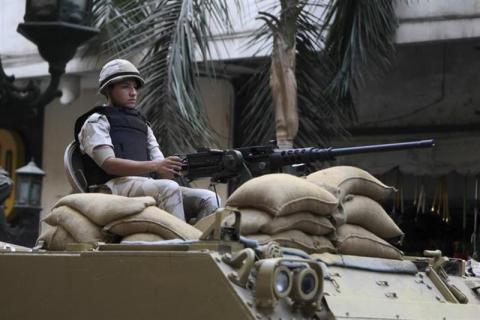Advertisement
Gunmen Kill Egyptian Army Officer And Soldier In Nile Delta
CAIRO (Reuters) - Gunmen killed an Egyptian military officer and a soldier in an attack on an army vehicle northeast of Cairo on Tuesday, security sources said, raising concerns that an Islamist insurgency is taking hold beyond the Sinai.
The number of militant attacks has risen since the army deposed President Mohamed Mursi of the Muslim Brotherhood on July 3, following mass protests against his rule.
Most of the attacks on the army have been limited to the relatively lawless Sinai, near Israel and the Gaza Strip, which is ruled by Hamas, an offshoot of the Muslim Brotherhood.
Tuesday's attack, which also wounded an army officer and a soldier, took place in Sharkia province in the Nile Delta. The assailants, who were in a vehicle, opened fire with automatic weapons, security officials said.
The army-backed government has been trying to restore security and create a sense of normality to bring back foreign investors and tourists to a country gripped by political upheaval since a revolt toppled autocrat Hosni Mubarak in 2011.
The Muslim Brotherhood emerged from the shadows to win elections, but millions of Egyptians became disillusioned with Mursi for giving himself sweeping powers and mismanaging the economy.
Army chief General Abdel Fattah al-Sisi, who ousted Mursi, has emerged as the most popular figure in Egypt, a strategic U.S. ally, and his promises to fight terrorism have won over many Egyptians, who long for stability.
Separately, one man was killed in clashes between supporters of Mursi and unknown people in the Suez Canal city of Port Said where rocks were thrown and machine guns and bird-shot were used, medical and security sources said.
More than 100 members of the security forces have been killed in almost daily attacks in the Sinai since Mursi was toppled, some involving rockets. On August 31, rocket-propelled grenades were fired at a vessel passing through the Suez Canal.
The most spectacular operation so far was a suicide car bombing that hit Interior Minister Mohamed Ibrahim's convoy in Cairo two weeks ago.
STATE OF EMERGENCY
Authorities have extended a state of emergency and imposed an overnight curfew to fight what they call terrorism, a reference to the Brotherhood and other Islamist groups.
Police arrested Muslim Brotherhood spokesman Gehad El-Haddad on Tuesday, security officials said, the latest high-profile detention in the crackdown on the Islamist movement.
Haddad was detained with two other Brotherhood officials in an apartment in Cairo. He served as chief of staff to deputy Brotherhood leader Khairat El-Shater and is the son of Essam El-Haddad, an aide to deposed Islamist president Mohamed Mursi.
Haddad, the Brotherhood's main point of contact with international media before the crackdown, is charged with inciting the killing of protesters.
Many of the Brotherhood's top leaders have been detained on similar charges since Mursi was deposed, triggering the worst spasm of violence in Egypt's modern history.
At least a thousand people have been killed since then, most of them Mursi supporters, but also scores of members of the security forces.
Mursi, who is being held at an undisclosed location, has himself been charged with inciting killing and violence. Besides Mursi, the Brotherhood's three top leaders are also in jail, together with the head of its political party. It is the toughest crackdown in decades on a group that has been repressed by successive military governments.
A court also upheld an order from the prosecutor's office freezing the assets of 25 leading members of the Brotherhood and allied Islamist parties.
Haddad was arrested together with Hossam Abu Bakr, a provincial governor under Mursi, and Mahmoud Abu Zeid, a member of the group's executive board.
The pressure on the Brotherhood shows no sign of easing. A military court jailed three members for two years on charges of inciting violence, security officials said.



















Add new comment